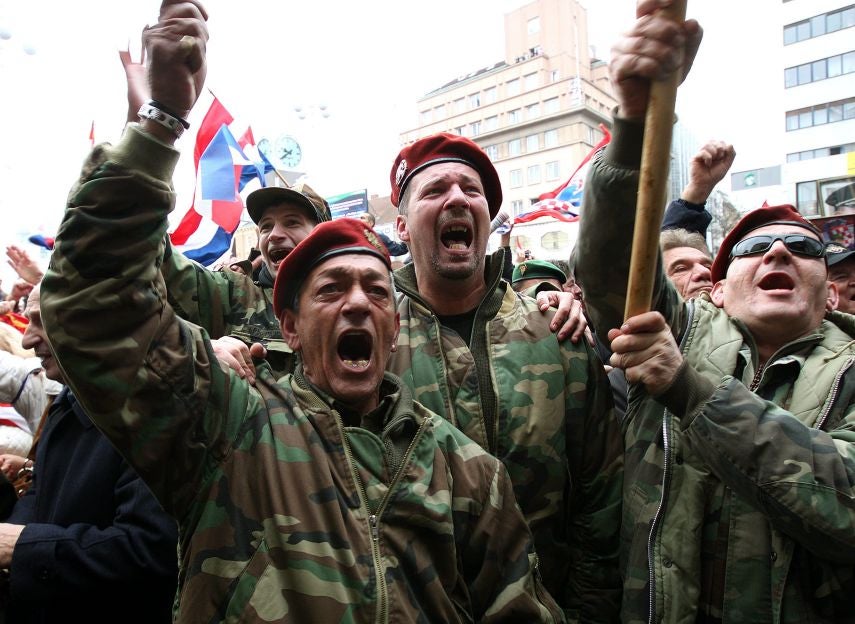UN war crimes court clears Croat generals of killing Serbs
Supporters jubilant as appeal judges rule pair did not purposely target Krajina civilians in 1995

Your support helps us to tell the story
From reproductive rights to climate change to Big Tech, The Independent is on the ground when the story is developing. Whether it's investigating the financials of Elon Musk's pro-Trump PAC or producing our latest documentary, 'The A Word', which shines a light on the American women fighting for reproductive rights, we know how important it is to parse out the facts from the messaging.
At such a critical moment in US history, we need reporters on the ground. Your donation allows us to keep sending journalists to speak to both sides of the story.
The Independent is trusted by Americans across the entire political spectrum. And unlike many other quality news outlets, we choose not to lock Americans out of our reporting and analysis with paywalls. We believe quality journalism should be available to everyone, paid for by those who can afford it.
Your support makes all the difference.A UN war crimes appeals court set free two former Croatian generals after clearing them of wrongdoing in connection with the murder and eviction of Serbs in 1995.
Ante Gotovina was given 24 years jail and Mladen Markac 18 years by the UN court last year for nine charges of atrocities and inhumane acts during a military operation.
However, the appeals court found the pair had not purposely targeted civilians during the operation to retake an enclave of rebel Serbs.
The men, both 57, listened to the 40-minute explanation by Judge Theodor Meron. When the acquittal was pronounced, Mr Gotovina smiled and shook Mr Markac's hand. There were also cheers and applause from the public gallery, while supporters outside the court in The Hague popped bottles of champagne.
Across Croatia, thousands of people watched on TV screens in coffee shops and homes, and cheers of "we are all Gotovina" rang out from city squares.
But there was shock in Serbia, where President Tomislav Nikolic said the acquittal was "a political decision", that would only "open old wounds".
Serbia's war crimes prosecutor, Vladimir Vukcevic, said "the principle of punishment for war crimes has been put into danger", while, Rasim Ljajic, head of the national office for cooperation with the UN tribunal for the former Yugoslavia, said that the court "has lost its credibility" with the ruling.
Operation Storm was part of Croatia's battle for independence from the former Yugoslavia, and involved crushing the rebellion of Krajina Serbs, who opposed the independence drive and were backed by Belgrade and former strongman Slobodan Milosevic.
The Krajina Serbs had created an enclave, logistically supported by Serbia, but it was retaken during Operation Storm in August 1995. About 200,000 Serbs were forced to flee, with more than 1,000 killed and still missing, many of them civilians. Long columns of tractors and trucks streamed into Serbia packed with Krajina refugees. Most of them have not returned to their homes, and the operation drastically reduced the number of Serbs in Croatia.
The court yesterday ruled the initial convictions had been based on the false premise that artillery targeting Serb towns more than 200 metres from a military target was a deliberate attack on civilians. "Without a finding that the artillery attacks were unlawful, the Trial Chamber's conclusion that a joint criminal enterprise existed cannot be sustained," the appeal verdict said. Judges also overturned the finding of "a joint criminal enterprise whose purpose was the permanent and forcible removal of Serb civilians from the Krajina region". At the time, the late Croatian president, Franjo Tudjman, said that the "Serb issue was settled once for all" by the operation.
Croatia will join the European Union next July, and one of the preconditions for its membership was the handing over of all war crime suspects from the 90s. The most wanted suspect, former general and French Foreign Legionnaire Gotovina, was arrested in the Canary Islands in 2005 after four years in hiding.
Croatian President Ivo Josipovic and Prime Minister Zoran Milanovic both welcomed the final acquittal of the former generals, who are hailed as national heroes at home.
"The sentence means our generals are innocent," Mr Josipovic said in Zagreb, but he added that it was "the responsibility of the state to establish what happened [in the war] and punish for crimes if they happened".
Join our commenting forum
Join thought-provoking conversations, follow other Independent readers and see their replies
Comments